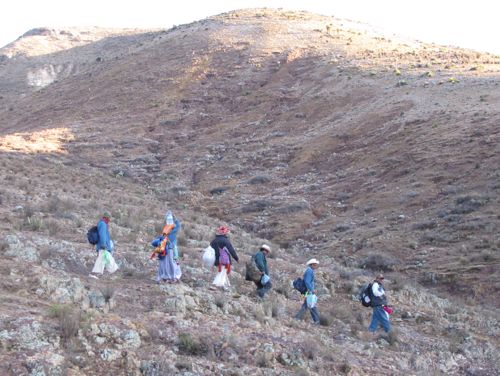By Juan Pablo García Medina / Environment News Service
For over 500 years, the Wixaritari Indians of Mexico have suffered from poverty, malnutrition and racism – today, they are also victims of global climate change.
For this ancient indigenous people living in the Sierra Madre Occidental mountain range of northwestern Mexico, droughts are growing more severe and more frequent, until now many communities have little or no water supply.
Climate change is affecting the Sierra Madre Occidental, with bigger droughts each year. The current drought has lasted for two years, making life much more difficult and increasing poverty in Wixaritari communities.
Drought has more serious consequences for the Wixaritari than it does for people in the cities, who are served by water pipes from large lakes.
In the Wixaritari communities, water scarcity has become the main issue. Women, old and young, walk many miles every day seeking a natural water source. They carry plastic bottles on their backs, hoping they can fill them all to supply the thirsty children awaiting their return – the children who are their most valuable treasures.
“We are looking for people to help our community. We don’t have water. We want to see if we can construct a dam,” says Urra Muire, a Wixárika leader who lives in the community of San Andres.
“It does not matter if help comes from Mexico, or from our brothers in the north or there in the other side in Europe. We are asking to whosoever that might come to help us so we can deal with the water problem,” says Muire.
“It is the challenge that I must overcome to help my people,” Muire says. “Since there is no water, wherever I go I speak of my community’s necessity. I want the whole world to be aware.”
Some Wixaritari communities do have a water supply based on a pump, hose and storage tank, but none are able to cleanse the water through an effective water treatment process.
Their water is contaminated with pesticides and mining residues as well as bacteria and organic compounds. As they have no water treatment, no contaminant is removed.
“Even though there is enough water in some of the communities; conducting, treating and storing it are three specific necessities,” says Omar Chiquete Anaya, community development coordinator for Desarrollo Integral de la Familia, or family integral development, in Jalisco’s Wixárika region.
“Water has become the main issue for this people,” says Anaya, a committed person who tries to alleviate Wixárika poverty every day.
Read more from Environment News Service:

